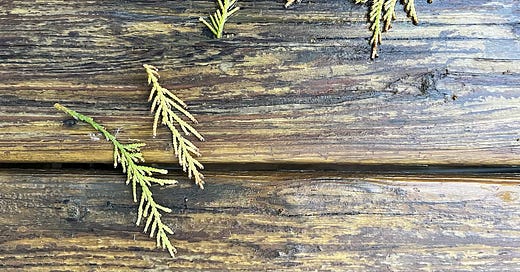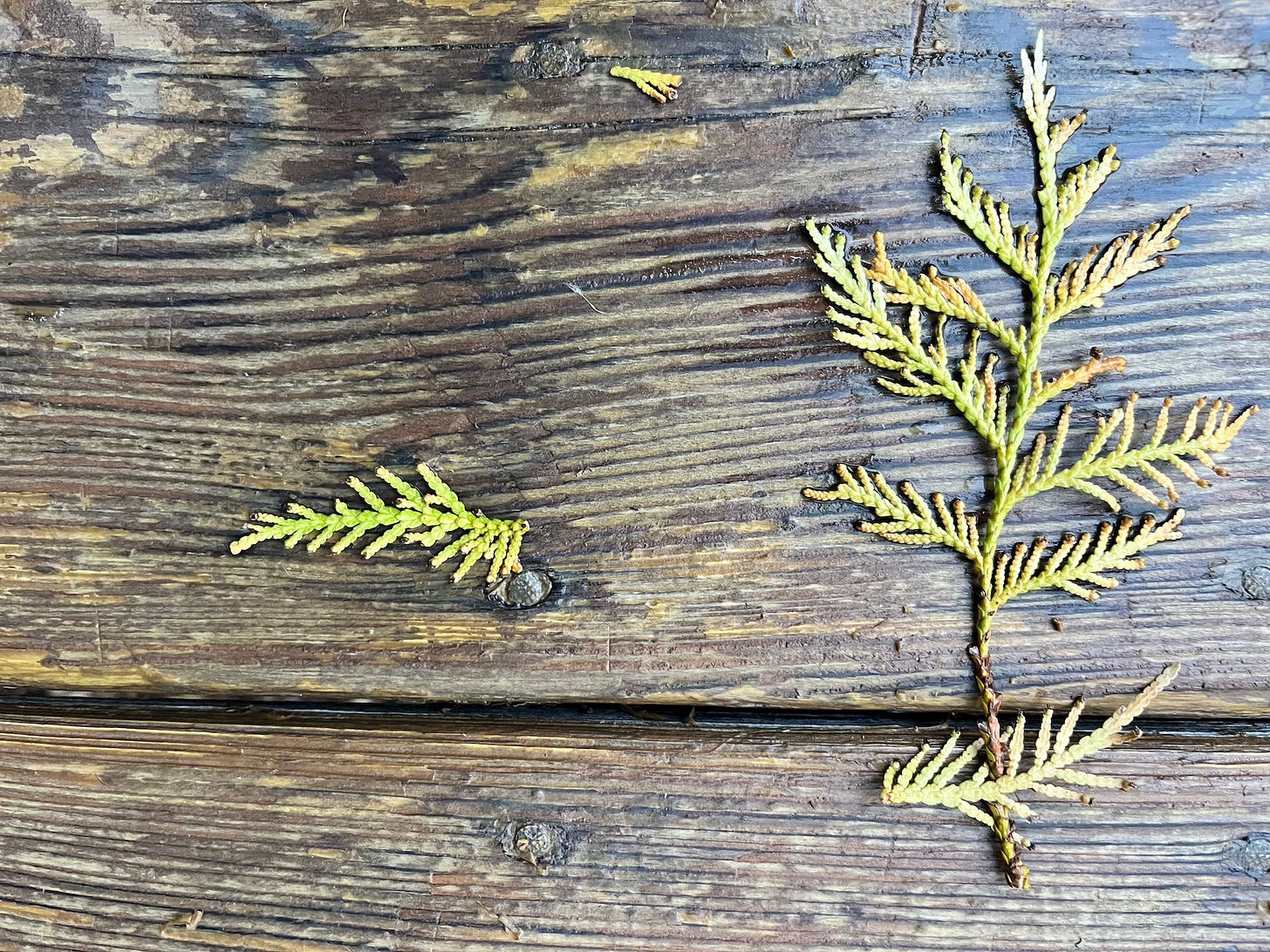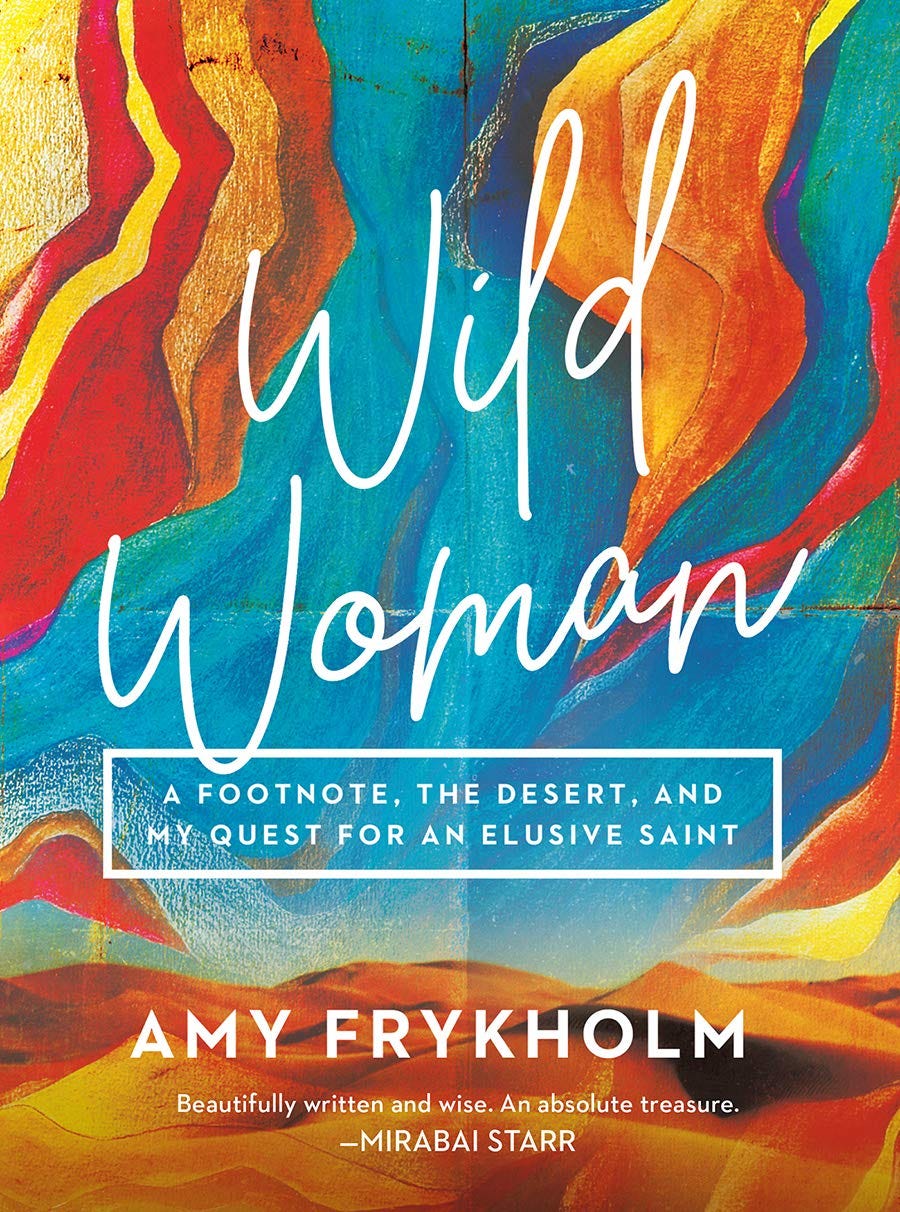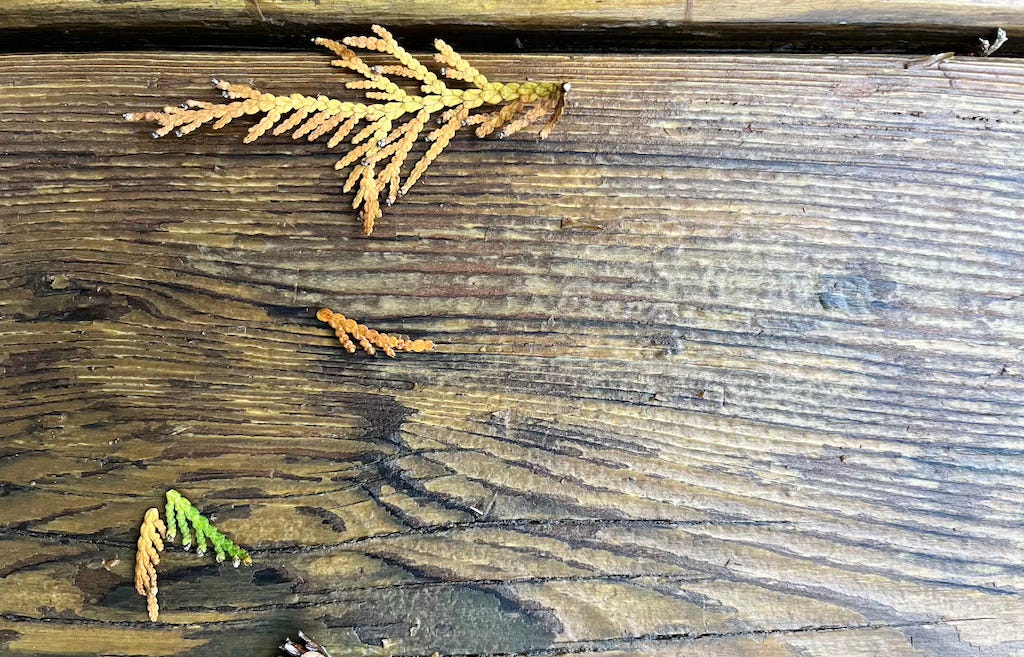A clue for living and working • hope in hard places • incubation and pilgrimage
For encouragement or joy or hope or camaraderie or all of the above
Hi dear reader,
On this Thanksgiving weekend, I’m thankful for many things, not the least of which is the Covid vaccine. I’d been thinking that maybe I was naturally immune to Covid, having gone three years without an infection, but that record recently came to an end. Even so, it was a mild infection, and for that I thank Katalin Kariko and Drew Weissman who in October of this year were awarded the Nobel Prize in Physiology and Medicine for their work that led to the mRNA Covid vaccines. Readers, you may remember that my mother died in the first round of Covid infections back in early 2020. In the past days shut away in my room, I thought much about her, how much I missed her, and how grateful she would be that her story need not be repeated in her children or grandchildren.
I have a few short things for your viewing and contemplative pleasure.
I recently read Fresh Water for Flowers by Valérie Perrin, translated from French by Hildegarde Serle. It’s a novel about a woman, Violette Toussaint, who is a caretaker of a cemetery in a small town in France. She lives on the premises and has been there for 20 years. One thing caught my eye early in the book.
One day a man, a detective (no, this isn’t a mystery), visits her on some personal business on behalf of his deceased mother. He asks some questions about a man buried there. When she’s able to answer his questions so readily, he expresses surprise. She tells him that she knows almost all the dead “by heart.” She tells him that she keeps registers.
“Your registers?”
“I record all burials and exhumations.”
“I didn’t know that was part of your job.”
“It isn’t. But if we had to do only what was part of our job, life would be so sad.” (italics mine)
In her registers, Violette did more than record a few simple facts. She attended each burial and wrote short essays about what happened and what she knew or had learned about the person who had died.
Here on page 31, I had to close the book and think a bit. And I’ve kept thinking about it long after the last page. For two reasons.
One, the care she took with each person who came to rest in the cemetery she managed. Each person. Friends and family of the deceased would randomly stop by her home at the entrance of the cemetery, sometimes months or years later, and ask about their loved one. She’d pour them a cup of coffee and pull out the relevant register and read what she’d written and they’d talk. Just imagine there being a door whose bell you could ring at any time and then be invited in to sit at a table with a good cup of coffee and talk about the one you missed with a person who had been paying attention, who had cared to notice, even when it wasn’t their job to do so.
Two, that last line: “If we had to do only what was part of our job, life would be so sad.” If I had read this while writing Finding Livelihood, I would have had to find a place for that line, written a chapter to emerge from that thought. Violette’s words are a clue for living and working.
My friend Cathy Warner copied out in her recent newsletter the title poem from her book Home by Another Road. The poem speaks to hope in hard places. Read it now and be encouraged. Or feel seen. Or bolstered. Or in the company of others. Read it and remember. Read it now and be hopeful.
Home By Another Road
I can’t tell you how it happens
except to say it does—
gradually often imperceptibly
until resting on the far side
we turn back to peer
into the tunnel—
cramped, damp, foreboding—
from which we’ve emerged.
Between hard place and rock
we somehow squeeze through
scraping years and inches
at a time until we crawl free
a bit bloody, but wiser, kinder
more resilient than possible.
We are not the same ones
who set out so long ago
innocent and unscathed.
Train wrecks and trauma
cancer and crashed economies
divorce, despair, and death—
familiar foes are shot through
the beautiful broken lives we lead.
And yet look at us, here we still are
walking home by another road
carrying the mended shards of dreams
in astounding new configurations.
Your resilience is pure miracle—
and if I believe in anything
I believe because of you
who still love—despite everything.
–Cathy Warner (used with permission)
If you want to read more of Cathy’s work, here’s a link to her Substack blog.
I ordered Amy Frykholm’s book, Wild Woman: A Footnote, the Desert, and My Quest for an Elusive Saint shortly after it came out in 2021 and started reading it then, but for some reason didn’t get very far before I was distracted and the book moved further and further down in my book piles. I almost gave it away earlier this year, let it go, but didn’t, and since then it started landing on various surfaces in my office and the beautiful cover repeatedly caught my attention.
There’s that book again!, I would think.
I started reading it several months ago when I brought it with me on a little weekend get away and was quickly relieved that I hadn’t let it go. The book is about Frykholm’s search for an elusive, third-century saint and former prostitute, Mary of Egypt.
It all started when a book mentioning Mary of Egypt jumped off a library shelf for Frykholm when she was there working on another project. At that time, she read some from the book, wrote a few things down, and then didn’t think about it again.
Many years passed and when the topic of Mary of Egypt again came to her attention, she went to find the notes she’d taken at the library, which she’d wisely filed away. She realized then that the subject had been burrowing in her brain all that time without her even realizing it. The subject had been percolating. Burrowing, percolating, incubating. All words that mean it had stayed with her and was growing deep inside. This was the start of Frykholm’s journey to discover and learn from Mary of Egypt, a pilgrimage journey that would take her to Egypt and change her life.
There are many reasons to read this beautiful book, but I’m calling it to your attention here now because it’s a story that starts with a book jumping off a shelf and changing someone’s life (it’s happened to me), and it’s an example of long-time hidden incubation of an idea that turns into something significant.
Doesn’t it make you wonder what might be incubating in you even now?
~
One more thing. Looking through the book as I wrote this, I see many many many sections underlined and starred, prompting me to want to say more about the book than what I have, particularly more about Frykholm’s writing on pilgrimage. But I’ll leave it at this one additional quote and encourage you to read the book. In fact, I want to reread it now myself.
“I could see now something about myself and about the pilgrimage. Pilgrimage offers the intense pleasure of seeing the world as a collection of signs pointing the way. You have to hone your skills of perception, cultivate the mysteries of beholding, attend relentlessly to what the “intelligence of the present” is telling you. I had come on a pilgrimage in order to transform the whole of my life into signs. I had to lean in close and listen. All the mysterious whisperings, dream images, and fleeting impulses became, under the conditions of pilgrimage, a method, a life-encompassing prayer: take me, lead me, show me.”
Thank you so very much for reading! May you see your work, however you define work in your life, as so much more than a job description. May you see hope. May you even now be incubating something of meaning.
[Photos: Taken after a very windy afternoon in which leaves from an arbor vitae hedge 20 feet away—leaves which typically don’t drop or blow off—landed on our deck bench in these most pleasing arrangements.]
If you like what you read here, please consider sustaining me with a cup of coffee, buying one of my books, or forwarding a post to a friend.








Dear Nancy,
I am always struck by your originality and creativity in what you write here. So true that we might place a book repeatedly at the bottom of the stack when it is meant for us! I loved Cather Warner's poem. Thank you for your words that inspire me. And thank you for your photographs that fit perfectly. xo Debra
Often I try to zip through my email inbox. However, your newsletter requires time to mull and meditate. I especially liked this post with poetry, pilgrimage, and philosophical lens with which to think about life.